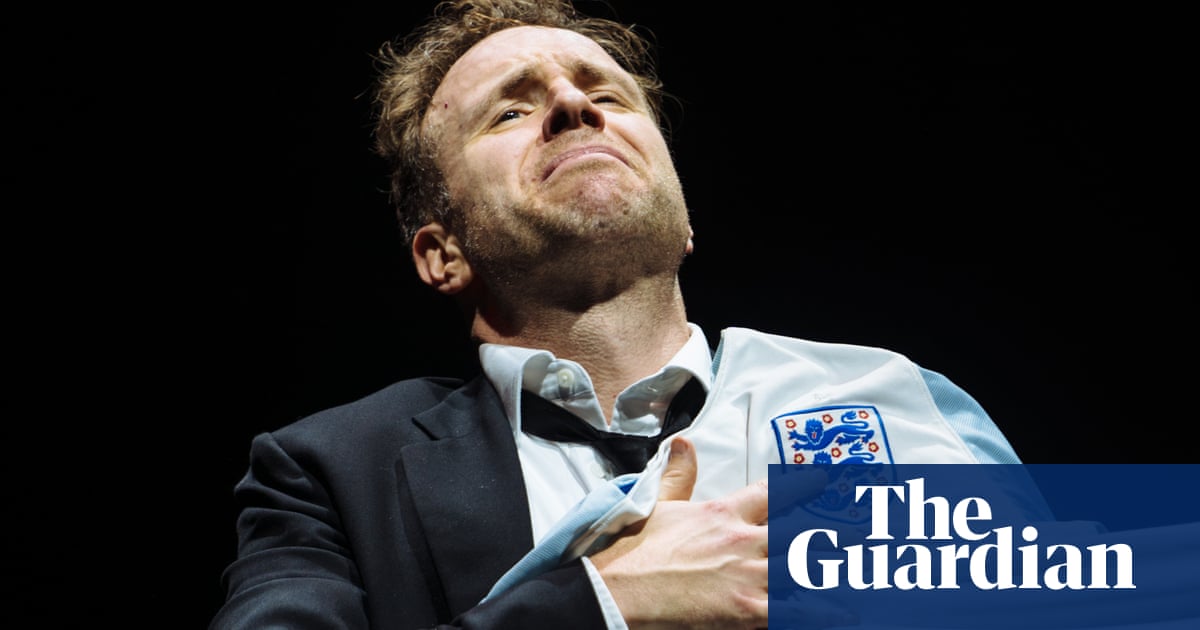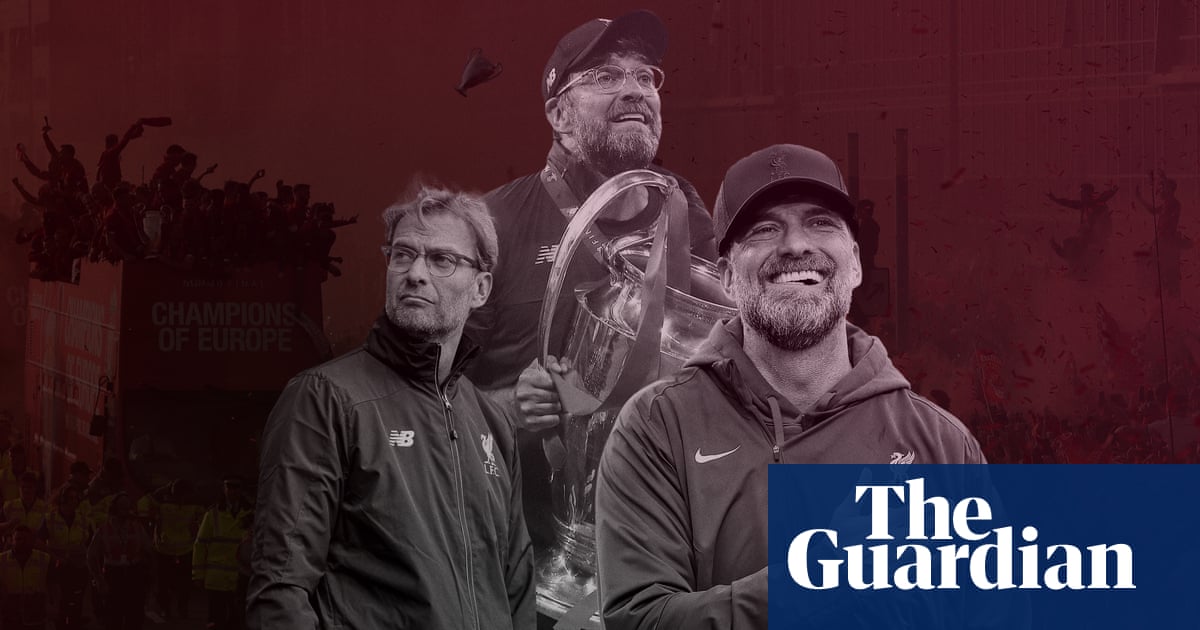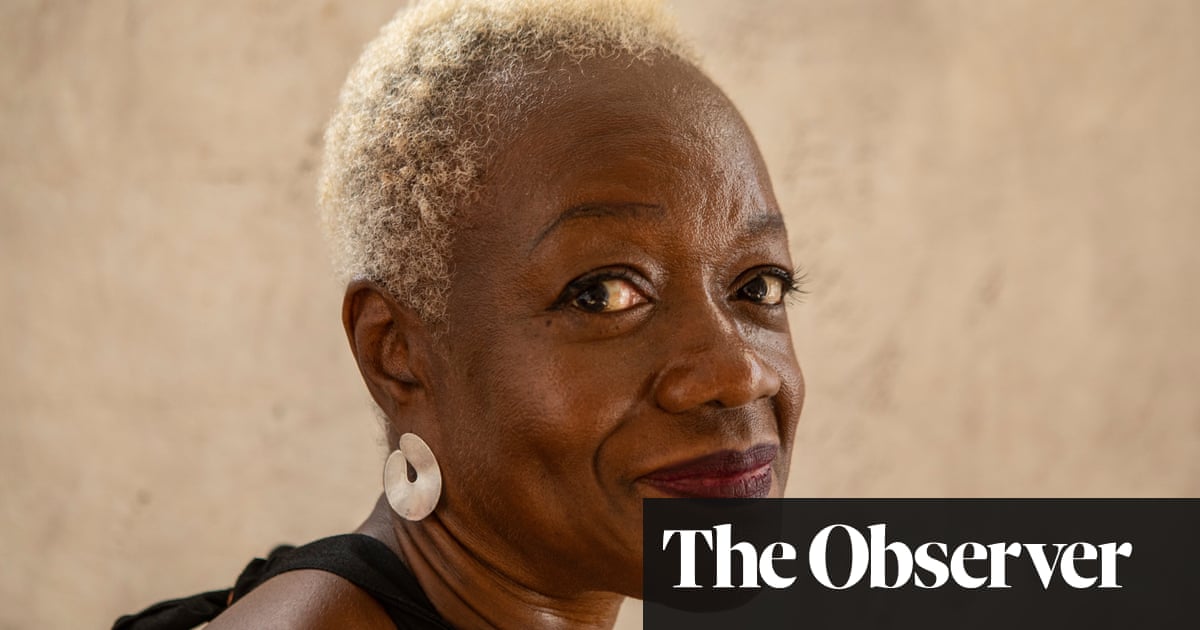
“Quiet on set, please!” They are not the words you might expect to hear at a theatre, but these are not usual times. Behind the stage and cosy velvet auditorium of the National Theatre’s Lyttelton venue, we are in a dark, cavernous complex overrun with wires and scaffolding, where the film Death of England: Face to Face is being shot.
Light falls through the windows of a makeshift flat where Delroy (played by Hamilton’s Giles Terera) is reconciling with his friend Michael (Utopia’s Neil Maskell) after a longstanding feud. The characters reflect on the tumultuous events of the day, before Michael takes Delroy’s baby daughter back to her mother. “I’ll have her back in your loving arms before it gets dark – just chillax,” Michael tells her on the phone. The dialogue continues but the baby’s unscripted wails prompt a “cut!” from director Clint Dyer.
The film, broadcast on Sky Arts this week, takes Dyer and co-writer Roy Williams’s Death of England saga – which has included two acclaimed stage plays – back to its original form: film. The series began with a microplay made with the Royal Court for the Guardian’s website in 2014, following a grieving son (played by Rafe Spall) who gives an alcohol-induced, no-holds-barred speech at his father’s funeral.
“It came off the back of England’s disastrous performance in the World Cup in 2014,” explains Williams. “They stank the house out – they were bloody awful!” It became a metaphor: not just how a football team may be viewed but a whole nation. Around the same time, Williams started hearing the word “Brexit”. The microplay’s title, Death of England, is “kind of how I felt – yeah, this country is going to die”.
That short film was later expanded for a monologue of the same name performed by Spall at the National’s Dorfman theatre at the start of 2020, followed by a sequel at the NT later that year. Face to Face is a feature film “but we’re telling it in a very theatrical way,” says Dyer. “So now we’re harnessing both mediums.”
It is the second film to be created solely for the screen by the National since the pandemic began. Simon Godwin’s production of Romeo and Juliet aired in spring. “The National was desperate to still employ all the people that it had employed for the original [stage] production of Romeo and Juliet,” says Dyer, who is the NT’s deputy artistic director. “The only way to keep it moving was to film it. And so the idea was to try and use the Lyttelton as a film studio.”
The success of Romeo and Juliet led them to consider the same treatment for Face to Face. The first stage sequel, the monologue Death of England: Delroy, was also affected by the coronavirus shutdown, which led to it closing early. “It ended on its first night,” explains Dyer. But there was a silver lining as that monologue was later streamed. “We won because thousands more people saw it … That was what really encouraged Rufus Norris [the National’s artistic director] to accept our crazy idea. I’m not sure if I’ve seen a film made in the same form. It’s a proper arthouse film, innit!”
“Originally, we thought we’d get kickback against some of the things we were saying,” says Dyer of the Death of England stage productions’ exploration of nationalism and identity. “But what we really found across the board was that people could tell that whatever we were saying was done with love – there’s an emphasis and an understanding inside it – none of it is done out of trying to poke the finger,” Dyer adds.
After Death of England, the pair found they had so much material that they could tell a story from the point of view of Delroy, the black best friend of Spall’s character, Michael. “As we wrote it, Delroy’s story came out, which is just as important – we gave it as much time as Michael’s,” says Williams. Death of England: Delroy was originally to star Giles Terera, but illness led him to be replaced on stage by Michael Balogun for a monologue that in part responded to the Black Lives Matter movement. Delroy, with an ankle tracker, recounts being unjustly arrested when en route to the hospital for the birth of his daughter. With Delroy’s story told, Williams explains that the next step was to “put them in the same room. Michael’s told his bit, Delroy’s told his bit – we want to hear them tell all that stuff to each other now.”
Death of England, in its various instalments, is a story about class, race, British identity and sport – more relevant than ever in light of the Euro 2020 racism and cricket’s current crisis. “It’s impossible to talk about ‘Britishness’ or ‘blackness’ without talking about what is considered the opposite – as in ‘whiteness’,” says Dyer. Yet, Death of England is among the few works to have a black character talk into the sensibilities of a white character, and vice versa. Delroy and Michael’s lenses are effectively those of the real-life experiences of Dyer and Williams – both growing up as black working class and predominately among the white working class.
Williams feels that he is “living in country that’s saying all the right things but not doing the right things to make me – and other people like me – feel equal. It’s what led me to want to write these stories.” For Dyer, the Death of England series is “the same conversation that I’ve been having in my work forever” but the difference is that “the response to my work has changed … I think that people are able to hear it in a more nuanced way ever before.”
The stories have become intertwined with the pandemic and Face to Face takes place during the January lockdown. Has Covid brought about newer and more inventive ways to create art? “I know it’s given voices to a lot of people that didn’t have voices before,” says Dyer. “I know that it pushed us to create in a way that we’ve never created before. I think most theatres would say that that was a fact. I hope one day when we’re really out of this that we can look back and applaud some of the amazing courage that was shown.”












